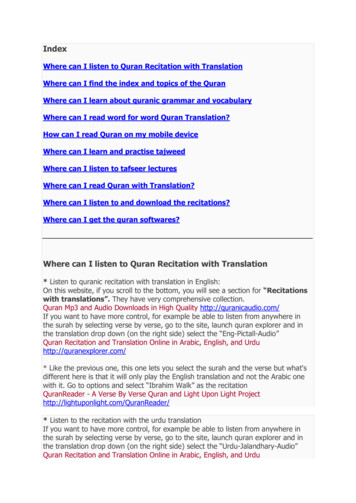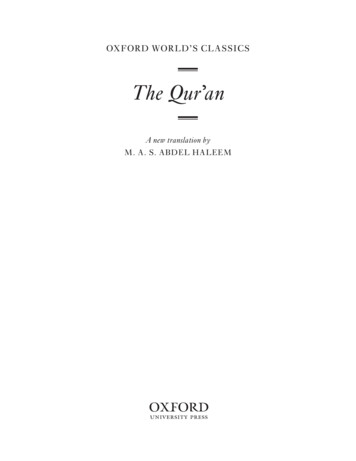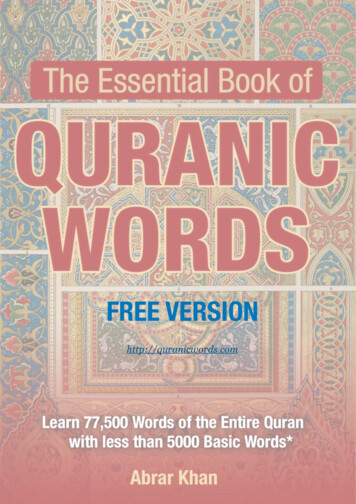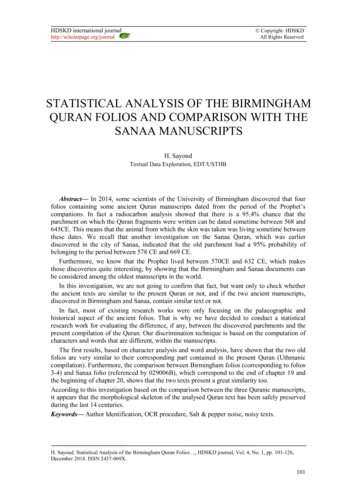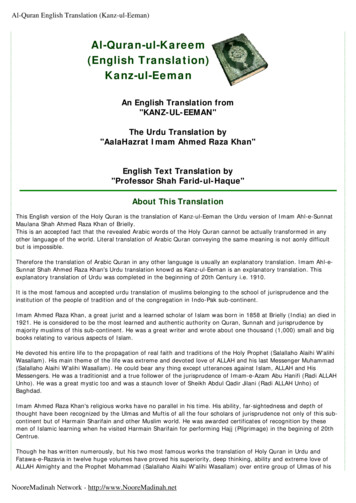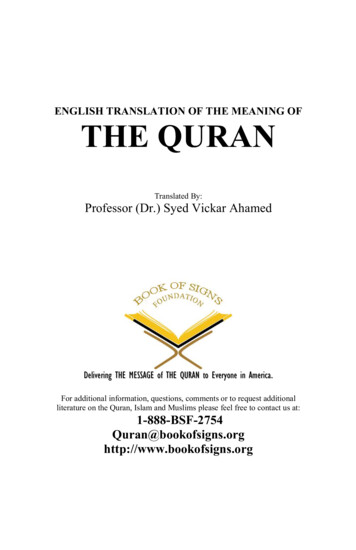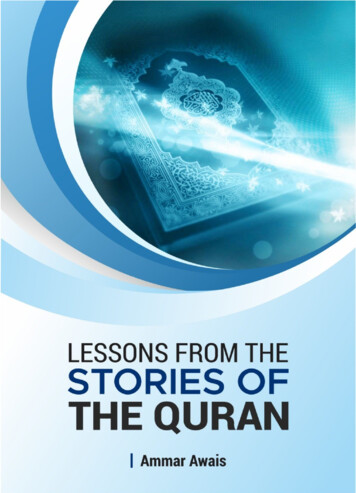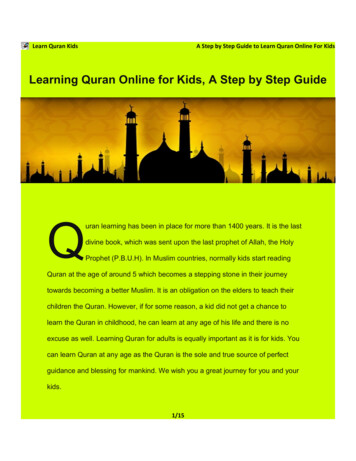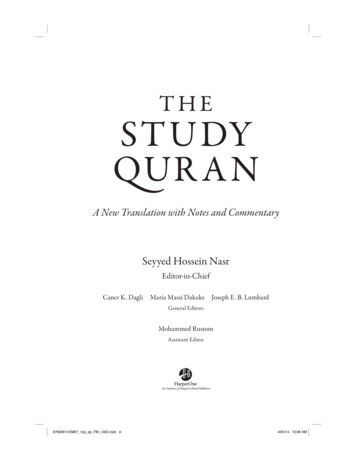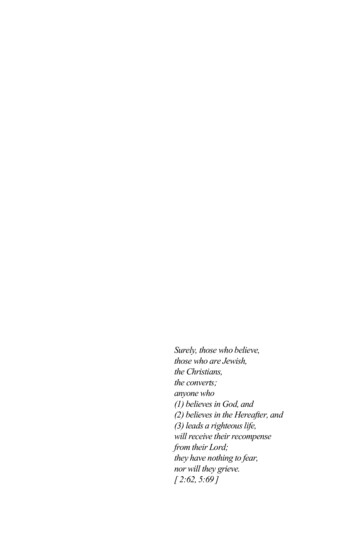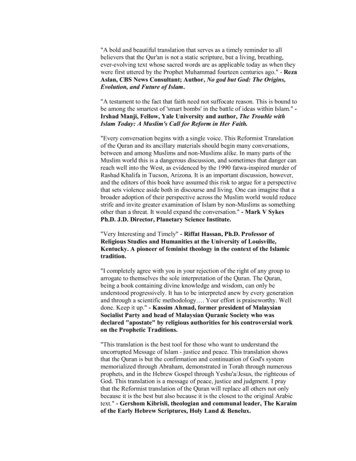
Transcription
"A bold and beautiful translation that serves as a timely reminder to allbelievers that the Qur'an is not a static scripture, but a living, breathing,ever-evolving text whose sacred words are as applicable today as when theywere first uttered by the Prophet Muhammad fourteen centuries ago." - RezaAslan, CBS News Consultant; Author, No god but God: The Origins,Evolution, and Future of Islam."A testament to the fact that faith need not suffocate reason. This is bound tobe among the smartest of 'smart bombs' in the battle of ideas within Islam." Irshad Manji, Fellow, Yale University and author, The Trouble withIslam Today: A Muslim's Call for Reform in Her Faith."Every conversation begins with a single voice. This Reformist Translationof the Quran and its ancillary materials should begin many conversations,between and among Muslims and non-Muslims alike. In many parts of theMuslim world this is a dangerous discussion, and sometimes that danger canreach well into the West, as evidenced by the 1990 fatwa-inspired murder ofRashad Khalifa in Tucson, Arizona. It is an important discussion, however,and the editors of this book have assumed this risk to argue for a perspectivethat sets violence aside both in discourse and living. One can imagine that abroader adoption of their perspective across the Muslim world would reducestrife and invite greater examination of Islam by non-Muslims as somethingother than a threat. It would expand the conversation." - Mark V SykesPh.D. J.D. Director, Planetary Science Institute."Very Interesting and Timely" - Riffat Hassan, Ph.D. Professor ofReligious Studies and Humanities at the University of Louisville,Kentucky. A pioneer of feminist theology in the context of the Islamictradition."I completely agree with you in your rejection of the right of any group toarrogate to themselves the sole interpretation of the Quran. The Quran,being a book containing divine knowledge and wisdom, can only beunderstood progressively. It has to be interpreted anew by every generationand through a scientific methodology . Your effort is praiseworthy. Welldone. Keep it up." - Kassim Ahmad, former president of MalaysianSocialist Party and head of Malaysian Quranic Society who wasdeclared "apostate" by religious authorities for his controversial workon the Prophetic Traditions."This translation is the best tool for those who want to understand theuncorrupted Message of Islam - justice and peace. This translation showsthat the Quran is but the confirmation and continuation of God's systemmemorialized through Abraham, demonstrated in Torah through numerousprophets, and in the Hebrew Gospel through Yeshu'a/Jesus, the righteous ofGod. This translation is a message of peace, justice and judgment. I praythat the Reformist translation of the Quran will replace all others not onlybecause it is the best but also because it is the closest to the original Arabictext." - Gershom Kibrisli, theologian and communal leader, The Karaimof the Early Hebrew Scriptures, Holy Land & Benelux.
"Quran: A Reformist Translation is distinct from other translations of theQur’an in several important ways. First, to the best of my knowledge, it isonly the second English translation of the Qur’an produced by Qur’anists-advocates of the concept of the Qur’an as the sole legitimate scripturalsource of religious law and guidance in Islam. As Qur’anists, Yuksel andhis colleagues reject the Hadith as sources of religious law and guidance anddo not rely on them in this translation and commentary. The first Qur’anistEnglish translation was done by the late Rashad Khalifa, a seminal figure inthe late twentieth-century Qur’anist movement who directly influenced bothYuksel and Shulte-Nafeh. Quran: A Reformist Translation is also uniquebecause it is the product of collaboration between two key figures in thepresent-day Qur’anist movement: Edip Yuksel and Layth Saleh al-Shaiban.The Qur’anist approach offers religious rather than secularist challenges totraditional understandings of Islam, whether Sunni, Shia, or academic, on anumber of critical issues; so this translation and commentary have thepotential to spark extreme controversy among Muslims and non-Muslims." Aisha Y. Musa, PhD, Assistant Professor of Islamic Studies, FloridaInternational University; author of An Examination of Early andContemporary Muslim Attitudes toward Hadith as Scripture (DoctoralDissertation, Harvard University, 2004)."With its lucid language, brilliant theological and philosophic arguments,Edip Yüksel removes the smoke of distortions and ignorance generated byclergymen that have concealed the light of the Quran from masses. Pullingour attention to numerous scientific evidences supporting the authenticity ofthe divine nature of the Quran, the Reformist Translation is destined tocreate a Copernican Revolution in the realm of religions. I highlyrecommend it to Agnostics, Skeptics, Christians, Hindus, Buddhists, oranyone who seeks truth about God without suppressing or compromisingtheir brains." - Caner Taslaman, PhDs in Theology and Political Science;Post doc fellow at Harvard University; author, The Quran:Unchallengeable Miracle; The Big Bang and God; The Theory ofEvolution and God; and The Invented Religion; www.mucizeler.com."Allah has gifted humanity with many signs for guidance. The Qur’an notonly directs us towards these signs all over creation, but also in itself is amost miraculous sign. We can never know the full meaning of the Qur’aneven as we exercise our minds and peacefully surrender our hearts to Allahso that we become able to read the signs and grow to know more. AReformist Translation directs us to this miracle by offering an intense andchallenging addition to the practice of sincere reading for knowing. I cannotaccept its Qur’an only perspective, even as I support the efforts of thesetranslators to engage, as they have, in reading and growing with knowledgewhile relaying to others some new possibilities of meaning for the sake ofreflection and peacefully surrender. I hope many will examine their effortsto gain benefit and challenge." - Dr. Amina Wadud, Author: Inside theGender Jihad: Reform in Islam.2
"A timely and stimulating contribution to scholarship on Islam that offerscogent testimony to the diversity of views within the Islamic community.This new translation challenges those in East and West alike who see Islamas irreconcilably opposed to the scientific and democratic impulses ofmodernity." - Germaine A. Hoston, Ph.D, Professor, University ofCalifornia. San Diego, former Director of the Center forDemocratization and Economic Development, and author of The State,Identity, and the National Question and Faith, Will, and RevolutionaryChange (forthcoming), a comparative study of theologies of liberation."I have to say that this translation --following in the same spirit of Dr.Khalifa's Quran: The Final Testament -- not only is daring, brave and nontraditional in its approach, it will open a lot of eyes that the Quran isdynamic in nature and relevant for all times. The spirit of using the Quran toexplain the Quran, namely trying to understand a certain word by searchingfor the meaning of the same word in many different contexts within theQuran, is very evident in this translation. This is a book that encourages thereader to use his/her intelligence faculty in order to understand the message,true to the key message of the Quran itself." - Gatut Adisoma, PhD,Indonesia."I am not a Qurâan scholar and therefore am not in a position to judge theaccuracy of your translation, and especially not the revisionistunderstandings of some controversial ayats. But I can say that the effort youand your colleagues have undertaken is very much in keeping with my senseof the process of modernization that the Qurâan itself and the Islamicreligion more broadly must undergo. As such, I salute your work and hope itwill be published and extensively discussed both in the United States andabroad." - Daniel Pipes, Ph.D., director of the Middle East Forum, editorof the Middle East Quarterly, and a columnist for The Jerusalem Post."From the perspective of the academic study of the Qur’an, this book hasvery little to contribute. . To proclaim that the Qur’an contains 20thcentury scientific discoveries renders meaningless the religious faith ofMuslims of the past who could not possibly have been aware of such aconcept. Controversy may assist book sales, as happened in the case ofThe Satanic Verses, but it would be a cynical and questionable strategy topublish a book simply because it arouses the wrath of many people. Simplyto publish this work as it is basically gives this religious group a platform toexpress their distinctive theology, which is highly polemical and dismissiveof other perspectives " – A anonymous Sunni Scholar who wasdescribed by the editor of Palgrave-Macmillan as "a very wellestablished professor."3
EDIP YUKSEL is an American-Turkish-Kurdish author and activist who spentfour years in Turkish prisons in the 1980's for his political writings and activitiespromoting an Islamic revolution in Turkey. He experienced a paradigm change in1986 transforming him from a Sunni Muslim leader to a reformed muslim orrational monotheist. Edip Yuksel has written more than twenty books and hundredsof articles on religion, politics, philosophy and law in Turkish, and numerousarticles and booklets in English. Edip is the founder of 19.org, and the IslamicReform organization. His personal site is yuksel.org. After receiving his bachelordegrees from the University of Arizona in Philosophy and Near Eastern Studies,Edip received his law degree from the same university. Edip is an AdjunctPhilosophy professor at Pima Community College, and teaches various classes athis children's school. He is fluent in Turkish, English and Classic Arabic; proficientin Persian, and barely conversant in Kurdish, his mother tongue.LAYTH SALEH AL-SHAIBAN is an author of various books and articles onIslam, founder of Progressive Muslims, and co-founder of Islamic Reform. Laythworks in a financial institution as a financial adviser, and lives in Saudi Arabia.MARTHA SCHULTE-NAFEH is Assistant Professor of Practice at the Universityof Arizona and Language Coordinator of Middle Eastern Languages at theDepartment of Near Eastern Studies. Martha received her B.S. from WhartonSchool, University of Pennsylvania in Economics, received her M.A., in Linguisticsfrom the University of Arizona in 1990, and her Ph.D. from the same university inNear Eastern Studies - Arabic Language and Linguistics 2004. In 1982, she taughtEnglish as a Foreign Language at American University in Cairo, Egypt.ACKNOWLEDGEMENT:We would like to thank the following individuals for their feedback, criticism andsuggestions: Aisha Musa, Ph.D.; Germaine A. Hoston, Ph.D.; Pierre Boyreau; MarkSyks, Ph.D., J.D; Chris Moore; Linda Moore; Ruby Amatullah; Oben Candemir,M.D.; Miriam Janna; Daniyar Shekebaev; Arnold Mol, Caner Taslaman, Ph.D.;Khaleel Muhammad Ph.D and the thousands others who shared their knowledgewith us through their words, mails, books, and critical reviews. We also would liketo thank Nima Aghili, J.D., for his feedback, comments, suggestions, and extensiveeditorial assistance. We should also mention Muhammad Kodzoez and TufanKaradere for volunteering their technical skills to design islamicreform.org and19.org, particularly a private internet forum that facilitated our early discussion onthe methodology and key words. Special thanks to Ogan Timinci and his sonTayfun.4
QURANA Reformist TranslationTranslated and Annotated byEdip YukselLayth Saleh al-ShaibanMartha Schulte-Nafeh The Reformist Translation of the Quran offers a non-sexist understanding of thedivine text; it is the result of collaboration between three translators, two men and awoman.It explicitly rejects the right of the clergy to determine the likely meaning ofdisputed passages.It uses logic and the language of the Quran itself as the ultimate authority indetermining likely meanings, rather than ancient scholarly interpretations rooted inpatriarchal hierarchies.It offers extensive cross-referencing to the Bible and provides arguments onnumerous philosophical and scientific issues.It is God's message for those who prefer reason over blind faith, for those who seekpeace and ultimate freedom by submitting themselves to the Truth alone.Brainbow PressHundred Fourteen BooksUnited States of America5
2007 Edip YukselEdip Yuksel & Layth Saleh al-Shaiban:Translated the main text of the Reformist Translation of the Quran.Edip Yuksel:Authored the annotations, subtitles, endnotes, introductory materials, and appendices.Martha Schulte-Nafeh:Provided linguistic consultation and feedback.A message for those who prefer reason over blind faith, for those who seek ultimate peace andfreedom by submitting themselves to the Truth alone.All rights reserved. No part of this book may be used, transmitted, or reproduced in any form or byany means whatsoever without the written permission of the author except in the case of briefquotations in reviews and critical articles. For permission requests or other information, contact thepublisher or Edip Yuksel electronically w.islamicreform.orgISBN 978-0-9796715-0-0Cover Design: Yusuf UrfalıPrinted in the United States of America10 9 8 7 6 5 4 3 26
Do not accept information on faith; critically evaluate it with your reason and senses(17:36) Ask the experts if you do not know (16:43) Use intelligence, reason and historical precedents to understand and carry out God’scommands (7:179; 8:22; 10:100; 12:111; 3:137) Do not dogmatically follow the status-quo and tradition; be open to new ideas (22:1;26:5; 38:7) Be open-minded and promote freedom of expression; listen to all views and followthe best (39:18) Do not follow conjecture (10:36,66; 53:28) Study God’s creation in the heavens and land; explore the beginning of creation(2:164; 3:190; 29:20) Attain knowledge, since it is the most valuable thing in your appreciation of God(3:18; 13:13; 29:43,49) Be a free person, do not follow crowds, and do not afraid of crowds (2:112; 5:54,69;10:62; 39:36; 46:13) Do not follow blindly the religion of your parents or your nation (6:116;12:103,112) Do not make profit from sharing God’s Message with others (6:90; 36:21; 26:109180) Read in order to know, and read critically (96:1-5; 55:1-4) Do not ignore divine revelation and signs (25:73) Do not miss the main point by indulging in small and inconsequential details (2:6771; 5:101-102; 22:67) Hold your judgment if you do not have sufficient information; do not rush intotaking a position (20:114)7
Following a Fatwa-Review of Establishment,Palgrave/Macmillan Abandoned the Publication of this BookIn 2004, my colleagues and I signed a contract with Palgrave/Macmillan publishing house for thepublication of Quran: a Reformist Translation. The editor and other staff of the publishing house werevery encouraging and enthusiastic, and during the summer of 2006, I was personally introduced to thedirector of the publishing company at its New York headquarters. Palgrave even published anannouncement about the upcoming Reformist Translation in their 2006 Fall/Winter Catalogue, whichwas later postponed to the summer of 2007. The publishing house posted information about theReformist Translation for pre-orders at Amazon.com and other online bookstores. However, inDecember 2006, the editor informed me that the board had determined that my manuscript was notacceptable for publication.Apparently, they were convinced or intimidated by a review (more accurately, a fatwa) of "a verywell-established professor," who misleadingly likened our annotated translation of the Quran toSalman Rushdie's Satanic Verses. This was akin to a medieval publishing house turning down MartinLuther's 95 Theses after consulting "a very well-established" Catholic Bishop! It is telling thatPalgrave's "very well-established scholar" in his several-page review, had only one substantivecriticism, which consisted of our usage of a word, yes a single word in the translation: progressive.I believe that without hearing my defense against this Sunni version of excommunication in the guiseof a "scholarly review," the publishing house committed an injustice against my person and our work.I called the publishing house and asked them to give me the chance to respond to the reviewer anddefend myself and work against his disparagement and distortions; I was told he remain anonymous.We were not surprised to hear negative remarks, insults, or false associations from a reviewer whoconsiders a rejection of backward and bankrupt sectarian dogmas "heresy." However, we weresurprised to learn that the board of the publishing house cancelled the publication of a potentiallycontroversial yet crucial book that would introduce the message of the Quran the message of peace,justice, reason, and progress without the distortion of sectarian teachings. Any scholar who can seebeyond his or her office can see the growing reform movement, open or clandestine, particularly inTurkey, Malaysia, Iran, Egypt and Kazakhstan where people take great risks to question the popularsectarian dogmas.You may visit the following websites for the full text of the letter of the Sunni scholar whose advicewas taken at face value by Palgrave/Macmillan, and for our response to the letter. You may also findin the following websites, recent updates, reactions, and feedback from reviewers, our responses,related news in the media, and the activities of the global reformist movement:www.19.orgwww.islamicreform.orgLet the world hear the message. Let the West hear the voice of monotheism, the voice of reason,peace, justice and progress. Let the East and the Middle East hear the clear message of the book thatthey have abandoned for centuries, despite efforts by their leaders to repress it.9:329:33They want to extinguish God's light with their mouths, but God refuses such and letsHis light continue, even if the ingrates hate it.He is the One who sent His messenger with guidance and the system of truth, to make itmanifest above all other systems, even if those who set up partners hate it.Edip YukselTucson, ArizonaJuly 2007
Table of Contents Translators’ Introduction10 QURAN: CHAPTERS 1 – 11440-394 Appendix 1: Some Key Words and Concepts395 Appendix 2: The "Holy" Viruses of the Brain407 Appendix 3: "On it is Nineteen"413 Appendix 4: Which one do you See: Hell or Miracle?425 Appendix 5: Manifesto for Islamic Reform439 Appendix 6: Why Trash All the Hadiths?487 Appendix 7: A Forsaken God?492 Appendix 8: Eternal Hell and the Merciful God?494 Appendix 9: No Contradiction in the Quran499 Appendix 10: Sala Prayers according to the Quran505 Appendix 11: Blind Watch-Watchers or Smell the Cheese510 Edip Yuksel's Upcoming Books in Years 2007-2008520PS: We decided that it is unnecessary to insert page numbers in the translation section, since eachverse is indicated with a number and they are ordered within chapters starting from verse 1:1 endingwith verse 114:6. The sum of all verses in the Quran is 6346 verses, including the 112 unnumberedBasmalahs.Asterisks (*) in the end of verses refer to our notes, comments, cross-references, and discussions inthe ENDNOTES section, which follows immediately the respective chapter. To visually separateENDNOTES from the text of the translation of the Quran, we used a smaller font, six digits for versenumbers, and full justification for the text.The subtitles in italics are not part of the Quran. We inserted subtitles to make the reading easier forthose whose attention might be compromised by fast-paced modern life complicated with numeroustasks and technologies.9
Translators’ Introduction:The Case for a Reformist Translation of the Quran"And had We sent it down upon some of the foreigners, and he recited it to them, they wouldnot have acknowledged it.” (26:199-200)"A book that We have sent down to you, that is blessed, so that they may reflect upon itssigns, and so that those with intelligence will take heed." (38:29)"The messenger said, 'My Lord, my people have deserted this Quran.'" (25:30)"Say, 'O people of the book, let us come to a common statement between us and betweenyou; that we do not serve except God, and do not set up anything at all with Him, and thatnone of us takes each other as lords beside God.' If they turn away, then say, 'Bear witnessthat we have peacefully surrendered.'" (3:64)" and God made a covenant with those who received the Book: 'Proclaim the scripture tothe people, and never conceal it.'" (3:187)"And you shall know the truth, and the truth shall make you free." (Old Testament, Isaiah61:1; 42:6-7; New Testament, John 8:32).Arguments against the practices and teachings of "Orthodox Islam" have created controversies in thepast and are likely to continue to do so in the future. But the Holy Quran, the word of God Almighty,demands that its words be proclaimed without misdirection or obstruction (3:187).This volume is undertaken in obedience to this command. Quran: A Reformist Translation is anEnglish version of the Quran that takes an accurate reading of what is in the Quran itself as thestandard. It thus abandons the rigid preconceptions of all-male scholarly and political hierarchies thatgave rise to the series of writings and teachings known as the "Hadith & Sunna", which, according tothe Quran itself, carry no authority according to the Quran itself (9:31; 42:21; 18:110; 98:5; 7:3;6:114). It is a progressive translation of the final revelation of God to all of humanity – a translationresonates powerfully with contemporary notions of gender equality, progressivism, and intellectualindependence. It is a continuation of the modern monotheist movement that started an era of paradigmchange and reform in 1974 with the fulfillment of a Quranic prophecy based on the number 19mentioned in chapter 74. 11As the fulfillment of a great prophecy, this discovery provided a verifiable and falsifiable powerful evidence forGod's existence, His communication with us, and perfect preservation of His message. Besides, it savedmonotheists from the contradiction of trusting past generations regarding the Quran, knowing that they havefabricated, narrated and followed volumes of man-made teachings, demonstrated ignorance, distorted themeaning of the Quranic words, and glorified gullibility and sheepish adherence to the fatwas of clerics. (SeeChapter 74 and Appendix 3).10
Centuries after the revelation of the Quran, understanding of the Quran was inevitably influenced bythe cultural norms and practices of tribal cultures in ancient Arabia, which were attributed to ProphetMuhammad and his close friends, and introduced as secondary religious sources besides the Quran.As the sample comparisons offered below demonstrate, these norms and practices distorted theperceptions of what the text actually said. When translation is liberated from these traditions theQuran conveys clearly a message that proclaims freedom of faith, promotes male and female equality,encourages critical thought and the pursuit of knowledge, calls for accountability and repudiation offalse authority, as well as the replacement of political tyranny and oppression through representationin government, Above all, it is God's command for the realization of justice for every man, woman,and child irrespective of ethnic origin or religion.By presenting the peaceful and unifying message of the Quran, we hope to increase understanding andreduce tensions between the "Muslim World" and people of other religions, especially those whomthe Quran calls the People of The Book (Jews and Christians). This translation will also highlight,without apology or distortion, the major differences between our approach and that of orthodoxtranslations and commentaries.Quran: A Reformist Translation offers a non-sexist understanding of the divine text; it is the result ofcollaboration between three translators, two men and a woman. We use logic and the language of theQuran itself as the ultimate authority in determining likely meanings, rather than previous scholarlyinterpretations. These interpretations, though sometimes useful as historical and scholarly referenceresources, are frequently rendered inadequate for a modern understanding and practice of Islambecause they were heavily influenced by patriarchal culture, relied heavily on the hearsay teachingsfalsely attributed to the prophet Muhammad, and were frequently driven by hidden or overt sectarianand political agendas. We therefore explicitly reject the right of the clergy to determine the likelymeaning of disputed passages.In the Reformist Translation, we also offer extensive cross-referencing to the Bible and attempt toprovide scientific and philosophical reasoning to support and justify the translation. We intend for thetranslation to reflect the original message of the Quran for those who have scholarly or personalcuriosity in it, and to provide an alternative perspective, unfettered by the constraints of uncriticallyaccepted interpretations that rely on hearsay accounts.We argue that any modern commentary on the Quran – and all translations are, by definition,commentaries upon the Arabic text – should not be monolithic, but should instead reflect theperspective and critical evaluation of diverse disciplines and populations. We also argue that thevoices of women, suppressed for so many centuries by Sunni or Shiite alike, should be taken intoaccount in any interpretation of these extraordinary verses. To correct the egregious historical biasesso obvious in previous English translations, we have chosen to take an inclusive approachincorporating input from scholars, lay readers, and even non-Muslims. The final word choices of theactual translation, however, are ours. We alone are responsible for them before God; if we have madean error, we appeal only to God for forgiveness.Since we reject all man-made religious sources, and accept only God's signs in nature and scripture asthe guide for eternal salvation, one might wonder about the presence of subtitles and extensiveendnotes in this translation. We would like to emphasize that the subtitles and endnotes are not part ofGod's word and they do not constitute a source or authority. We think that this is the best availableEnglish translation and the most accurate in its rendering the meaning of the scripture. Anytranslation, by the very nature of the deficiency of one-to-one correspondence among humanlanguages, is not identical to the original text and reflects our fallible understanding that is taintedwith limited time, limited knowledge and human weaknesses. However, a translation done with amonotheistic paradigm and clear mindset, despite some inevitable loss in rendering the richness andeloquence of the original text and minor translation errors, it will convey the intended message of theQuran to the world in any language.11
"Had We made it a non-Arabic compilation, they would have said, 'If only its signs weremade clear!' Non-Arabic and Arabic, say, 'For those who acknowledge, it is a guide andhealing. As for those who reject, there is deafness in their ears, and they are blind to it. Thesewill be called from a place far away.'" (41:44)One might notice that we did not refer to books of Hadith and Sunna, since they are commonlyidolized and associated partners with the Quran. Their perceived value is wrongly based on thesanctified names of the narrators and the authority of the collectors, rather than their substance.Muslims, or submitters to God alone, might read and benefit from studying any book, including booksof Hadith and sectarian jurisprudence, without considering them infallible authorities or partners withGod's word. Similarly, we might benefit from the ideas of philosophers and scientists regardless oftheir religious position or affiliation.The Quran puts the search for truth and its acknowledgement as a top priority for us, and uses theword "truth" more than two hundred times. Additionally, the Quran uses the word "the truth" or"Truth" (Haq) as an attribute of God. We should acknowledge and appreciate any truth, be it in thescripture or nature. Search for truth should be continuous, since we are imperfect humans. However,the only truth that is relevant for our eternal salvation is the one expressed and implied in the Quran,which is basically the same with the message of revealed books in the past. When we assert that Godalone is the authority in defining the system of Islam, we mean that no signature and no authoritybeside God will be considered as justification for the truth-value of a proposition regarding Islam.Thus, a statement made by this or that scholar or clergymen, by this or that messenger or prophet, hasno truth-value just because they said so. Prophets, messengers, and scholars, all are humans like us,and their personal statements or understanding of God's word have no authority in defining Islam, thesystem exclusively defined by God (9:31; 42:21; 18:110; 98:5; 7:3; 6:114).Each of us is responsible for our own understanding. We may exchange views and benefit from oneanother’s insights, but we should never value each other's understanding on the basis of rank,diploma, reputation, the number of halos, the size of turban, or the length of the beard (17:36; 10:100;39:18).Thus, our understanding, inferences and arguments in this translation should not be accepted justbecause they are those of scholars in theology, linguistics, or philosophy. The reader is invited to takea critical perspective to this as well as to other translations, thinking carefully about the words andfollowing those that seem the best (39:18), The point is that as each individual is responsible alone toGod on the Day of Judgment the reader must not abandon intellectual responsibility to
"Quran: A Reformist Translation is distinct from other translations of the Qur’an in several important ways. First, to the best of my knowledge, it is only the second English translation of the Q
